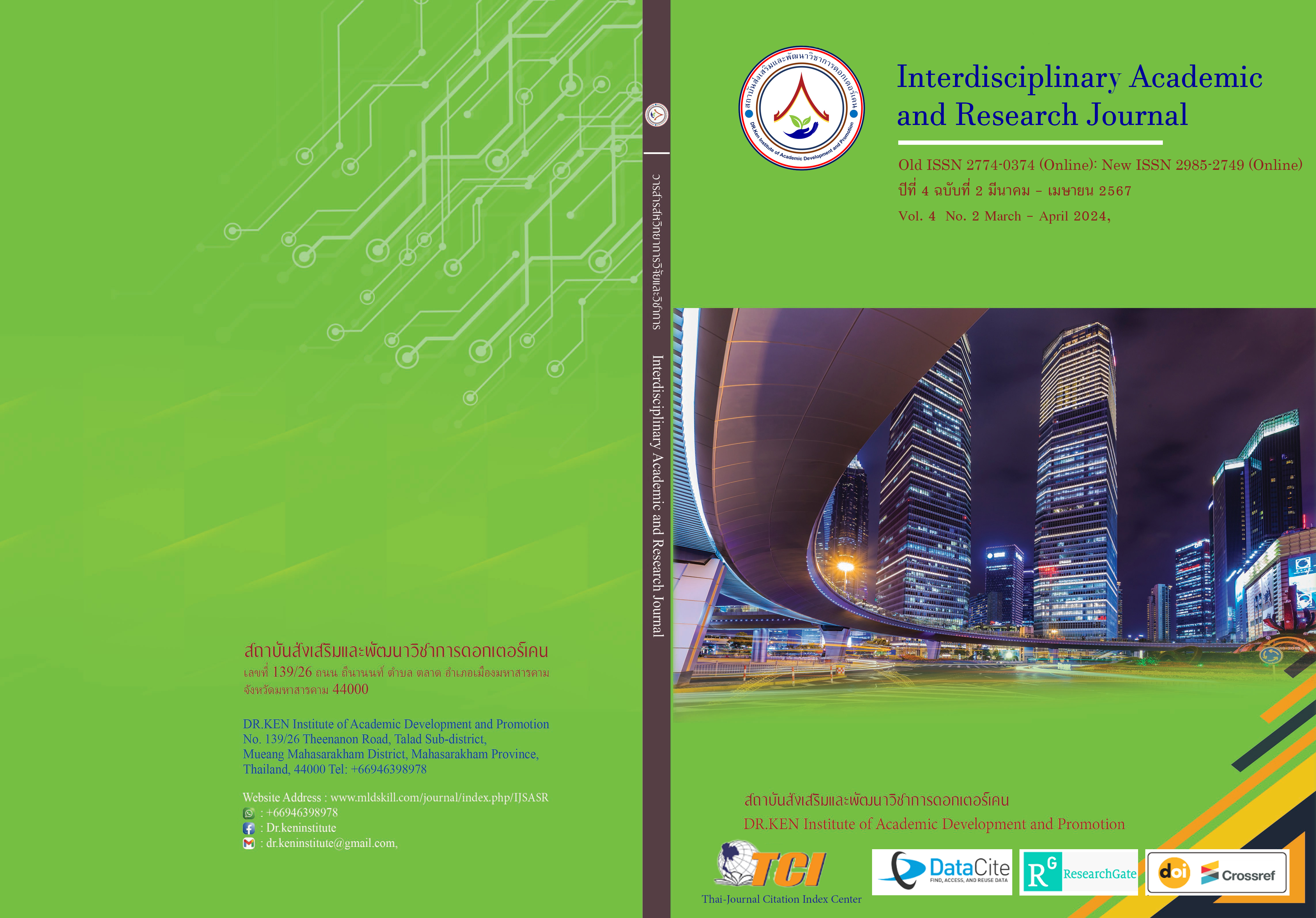A Comparison of Factors Related to Academic Achievement in English Between Study Plans of Mathayom Suksa Five Student
DOI:
https://doi.org/10.60027/iarj.2024.274693Keywords:
Academic Achievement; , English Subject; , Comparing FactorsAbstract
Background and Aims: Learning English aims to communicate, gain knowledge, and have further education. Anyway, the differences in prior knowledge and the capabilities of students are important factors that can cause the difference in English learning achievements. In this thesis, the researcher examines factors related to 1) The learning achievement in English of Matthayom Suksa Five students and 2) compares factors related to learning achievement in English between the study plans of Matthayom Sueksa Five students.
Methodology: The research population was Matthayom Suksa Five students at schools under the jurisdiction of the Secondary Educational Service Area Office One, Bangkok Metropolis. Employing the multistage sampling method, the researcher collected a sample population of 636 students. The research instrument was a questionnaire, which had a reliability of 0.97. The data collected were subsequently analyzed by One-way MANOVA.
Results: (1) The study of factors related to learning achievement in English of Matthayom Sueksa Five students showed the following: The variable with the highest weight for classificatory function was previous knowledge (a mean of 71.98). Next in descending order were motivation toward the study of English (a mean of 4.16), teaching quality of teacher (a mean of 4.03), learning atmosphere (a mean of 3.84), learning behavior (a mean of 3.47), attitudes toward the study of English (a mean of 3.20), and family relationships (a mean of 3.12) and (2) The study of comparison of factors related to learning achievement in English between study plans of Matthayom Sueksa Five students exhibited attitudes toward the study of English, learning behavior, teaching quality of teacher, learning atmosphere, and previous knowledge were different between study plans at the statistically significant level of .05. and motivation toward the study of English, and family relationships were no differences.
Conclusion: The study underscores the critical influence of various factors on learning achievement in English among Matthayom Sueksa Five students, with previous knowledge identified as the most significant determinant. Additionally, the comparison across study plans reveals noteworthy variations in specific factors, indicating the importance of considering diverse aspects for targeted interventions. These findings contribute valuable insights for educators and policymakers aiming to enhance English education outcomes by addressing the nuanced interplay of individual and contextual elements.
References
กระทรวงศึกษาธิการ. (2551). หลักสูตรการศึกษาขั้นพื้นฐาน พุทธศักราช 2551. โรงพิมพ์คุรุสภาลาดพร้าว.
กระทรวงศึกษาธิการ. (2557). ประกาศกระทรวงศึกษาธิการ เรื่องนโยบายการปฏิรูปการเรียนการสอนภาษาอังกฤษ. Retrieved from: https://mdh.go.th/news_file/p24516701356.pdf
กุสุมา เลาะเด. (2565). ปัจจัยที่มีอิทธิพลต่อผลสัมฤทธิ์ทางการเรียนของนักศึกษาที่เรียนในกลุ่มวิชาภาษาอังกฤษธุรกิจ มหาวิทยาลัยราชภัฏวไลยอลงกรณ์ ในพระบรมราชูปถัมภ์. วารสารวไลยอลงกรณ์ปริทัศน์ (มนุษยศาสตร์และสังคมศาสตร์), 12(2), 61-74
ชลกร ชุ่มกลาง. (2562). การสังเคราะห์งานวิจัยที่ศึกษาปัจจัยที่ส่งผลต่อผลสัมฤทธิ์ทางการเรียนภาษาอังกฤษระดับการศึกษาขั้นพื้นฐาน: การวิเคราะห์เอ็มเอเอสอีเอ็ม มหาวิทยาลัยบูรพา. วารสารการศึกษาฉบับออนไลน์คณะศึกษาศาสตร์ มหาวิทยาลัยบูรพา, 1(2), 1-15.
ณัฐดนัย สุวรรณสังข์. (2561). การวิเคราะห์จำแนกปัจจัยที่เกี่ยวกับผลการเรียนวิชาภาษาอังกฤษของนักเรียนชั้นมัธยมศึกษาปีที่ 5 โรงเรียนสังกัดสำนักงานเขตพื้นที่การศึกษามัธยมศึกษา เขต1. วิทยานิพนธ์ปริญญาศึกษศาสตรมหาบัณฑิต: มหาวิทยาลัยรามคำแหง.
เตือนใจ เขียนชานาจ. (2562). ปัจจัยที่ส่งผลต่อผลสัมฤทธิ์ทางการเรียนวิชาภาษาอังกฤษของนักเรียนชั้นมัธยมศึกษาตอนต้น สังกัดสำนักงานเขตพื้นที่การศึกษา มัธยมศึกษา เขต 8. วารสารบัณฑิตศาส์น มหาวิทยาลัยมหามกุฏราชวิทยาลัย, 17(1), 222-235.
เนตรชนก วงศ์สุเทพ. (2561). ปัจจัยที่มีอิทธิพลต่อผลสัมฤทธิ์ทางการเรียนวิชาภาษาจีนของนักเรียนระดับชั้นมัธยมศึกษาตอนปลายแผนการเรียนศิลป์ (ภาษาจีน) ในโรงเรียนสังกัดสานักงานเขตพื้นที่การศึกษามัธยมศึกษา เขต 18. วิทยานิพนธ์ปริญญาวิทยาศาสตรมหาบัณฑิต: มหาวิทยาลัยบูรพา.
บุศรา เต็มลักษมี. (2558). ปัจจัยที่มีความสัมพันธ์ต่อผลสัมฤทธิ์ทางการเรียนวิชาภาษาอังกฤษของนักเรียนชั้นมัธยมศึกษาตอนต้นจังหวัดประจวบคีรีขันธ์ สังกัดสำนักงานเขตพื้นที่การศึกษามัธยมศึกษา เขต 10. วิทยานิพนธ์ปริญญาศึกษาศาสตรมหาบัณฑิต: มหาวิทยาลัยบูรพา.
ปุณยนุช เขียดแก้ว. (2565). อิทธิพลของพ่อแม่มีผลต่อการศึกษาของลูกมากน้อยเพียงใด. Retrieved 25 April 2022 from: https://sites.google.com/a/srp.ac.th/srp30749/xiththiphl-khxng-phx-mae-mi-phl-tx-kar-suksa-khxng-luk-mak-nxy-pheiyng-di.
รสรินทร์ ปิ่นแก้ว และ ภานุวัฒน์ ศิรินุพงศ์. (2560). ปัจจัยที่ส่งผลต่อผลสัมฤทธิ์ทางการเรียน วิชาภาษาอังกฤษในชีวิตจริง 1 ของนักเรียนระดับประกาศนียบัตรวิชาชีพประเภทวิชา อุตสาหกรรม วิทยาลัยอาชีวศึกษาในเขตกรุงเทพมหานคร สังกัดสำนักงานคณะกรรมการการอาชีวศึกษา. วารสารวิชาการศึกษาศาสตร์ คณะศึกษาศาสตร์ มหาวิทยาลัยศรีนครินทรวิโรฒ, 18(1), 83-93.
ศันศนี โคตรชมพู, เชาว์ อินใย, และ จุฑามาส ศรีจำนงค์. (2559). โมเดลสมการโครงสร้างพหุระดับปัจจัยที่มีอิทธิพลต่อผลสัมฤทธิ์ทางการเรียนวิชาภาษาอังกฤษของนักเรียนชั้นประถมศึกษาปีที่ 6 สังกัดสำนักงานเขตพื้นที่การศึกษาประถมศึกษาหนองบัวลำภู เขต 1. วารสารศึกษาศาสตร์ มหาวิทยาลัยนเรศวร, 18(4), 308-323.
สถาบันทดสอบทางการศึกษาแห่งชาติ (องค์การมหาชน). (2565). รายงานผลการทดสอบทางการศึกษาระดับชาติขั้นพื้นฐาน (O-NET) ชั้นมัธยมศึกษาปีที่ 6 ปีการศึกษา 2565. สถาบันทดสอบทางการศึกษาแห่งชาติ (องค์การมหาชน). https://www.niets.or.th/th/
สมศักดิ์ วันโย. (2558). ปัจจัยที่มีอิทธิพลต่อผลสัมฤทธิ์ทางการเรียนวิชาภาษาอังกฤษ ของนักเรียนชั้นประถมศึกษาปี ที่ 6 สังกัดสำนักงาน เขตพื้นที่การศึกษาประถมศึกษาบึงกาฬ. วิทยานิพนธ์ปริญญาครุศาสตรมหาบัณฑิต: มหาวิทยาลัยราชภัฏมหาสารคาม.
สุชาวดี ประสพเนตร. (2560). ปัจจัยที่ส่งผลต่อผลสัมฤทธิ์ทางการเรียนรายวิชาภาษาอังกฤษฟังพูด. วิทยานิพนธ์ปริญญาวิทยาศาสตรมหาบัณฑิต: มหาวิทยาลัยสงขลานครินทร์.
แสงเดือน บุญแย้ม. (2561). ปัจจัยเชิงสาเหตุที่มีอิทธิพลต่อผลสัมฤทธิ์ทางการเรียนวิชาภาษาอังกฤษของนักเรียนชั้นมัธยมศึกษาปีที่ 2 สำนักงานเขตพื้นที่การศึกษามัธยมศึกษา เขต 31. วารสารวิชาการมหาวิทยาลัยราชภัฏศรีสะเกษ, 12(3), 12-18.
Abdallah, H.E. (2016). Factors affecting students' achievement in English language learning. Al-Balqa Applied University.
Bloom, B.S. (1976). Human characteristics and school learning. McGraw-Hill.
Dörnyei, Z. (2005). The psychology of the language learner: Individual differences in second language acquisition. Routledge.
Epstein, J. L. (2010). School/family/community partnerships: Caring for the children we share. Phi Delta Kappan, 76(9), 701-712.
Gardner, R. C. (2006). The socio-educational model of second language acquisition: A research paradigm. EUROSLA Yearbook, 6(1), 237-260.
Hattie, J. (2009). Visible learning: A synthesis of over 800 meta-analyses relating to achievement. Routledge.
Ma, F. (2021). Factors affecting the English language preparedness of college freshman students. Journal of Language Teaching and Research, 12(2), 252-257. http://dx.doi.org/10.17507/ jltr.1202.05
Smith, J. K. (2010). The role of prior knowledge in learning from meaningful verbal learning experiences. Journal of Verbal Learning and Verbal Behavior, 9(3), 417-428.
Sulistiyo, U. (2018). Factors affecting English language learning in English as a foreign language (EFL) context: A literature review study. IJER, 3(1), 20 – 24. http://ijer.ftk.uinjambi.ac.id/ index.php/ijer
Syed, A.F., Hussain, I., Khan, A.R., &. Anwaar, S. (2020). Factors affecting the achievement of engineering students in English. University of Lahore Sargodha Campus, Pakistan.
Downloads
Published
How to Cite
Issue
Section
License
Copyright (c) 2024 Interdisciplinary Academic and Research Journal

This work is licensed under a Creative Commons Attribution-NonCommercial-NoDerivatives 4.0 International License.
Copyright on any article in the Interdisciplinary Academic and Research Journal is retained by the author(s) under the under the Creative Commons Attribution-NonCommercial-NoDerivatives 4.0 International License. Permission to use text, content, images, etc. of publication. Any user to read, download, copy, distribute, print, search, or link to the full texts of articles, crawl them for indexing, pass them as data to software, or use them for any other lawful purpose. But do not use it for commercial use or with the intent to benefit any business.
















.png)


